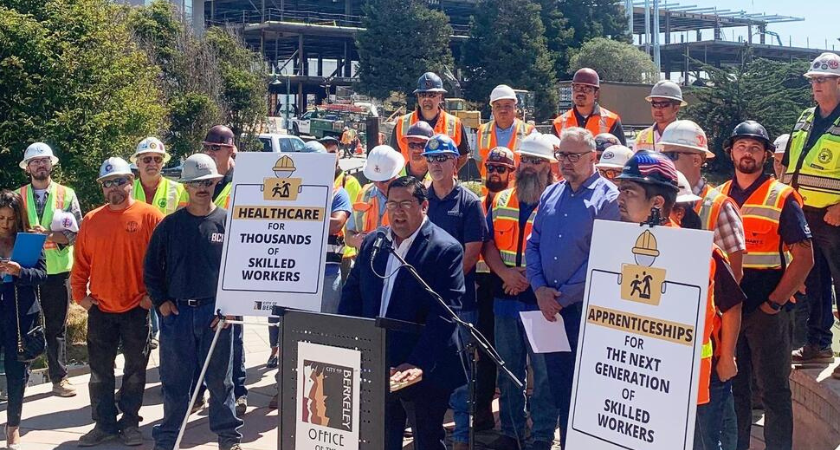
More than two years ago, Berkeley adopted strict, union-supported requirements intended to reshape how large projects are built in the city. Those rules — including mandates for apprenticeships, health coverage, prevailing wages and even bird-safe glass — were meant to raise construction standards and protect workers. Today, those same rules are at the center of a political and legal showdown that could determine whether local labor policies survive statewide housing pressures.
Developers behind three major apartment proposals in Berkeley have found a path around these mandates by invoking California’s powerful housing density bonus law. The law, which was designed to encourage affordable housing by granting exemptions from restrictive zoning, is now being used to avoid construction labor standards that unions say were “hard fought” and essential for worker protection.

Union leaders are sounding the alarm. At a hearing last Thursday, Daniel Gregg of the Nor Cal Carpenters Union issued a stern warning to Berkeley officials.
“It’s unfortunate that we find ourselves here tonight witnessing the dismantling of hard-fought worker protections,” Daniel Gregg said.
The Zoning Adjustments Board voted to approve a 23-story residential tower on University Avenue without requirements for health insurance, apprenticeship programs, or bird-safe glass. Similar exemptions were granted for a 169-unit high-rise at 2425 Durant Ave. and a smaller 65-unit building planned nearby. Unions fear that developers across the state will adopt the same strategy, effectively overturning years of local policymaking.
Development consultants and builders contend the density bonus law is clear: if a project includes affordable units, local regulations that increase cost can be waived. Consultant Mark Rhoades argued that Berkeley’s policies are financially unrealistic in a market with volatile financing and soaring construction expenses.
“Our former City Council adopted a set of standards that put enormous cost pressure on housing development in Berkeley,” Rhoades said. “They set the unions up for failure.”
Developers say the city’s requirements add millions to project budgets. One company, Walnut Creek–based Laconia Development, estimates that compliance for its 2029 University Ave. project would exceed $5 million, including $2.8 million for health benefits, $1.9 million for apprenticeship programs, and $400,000 for bird-safe glass. Lawyers for the firm told the zoning board that the law explicitly supports such exemptions, stating the mandates are:
“exactly the sort of costly ‘development standards’ the (density bonus law) requires local agencies to eliminate when incentives are requested.”
Rhoades insisted rising expenses make compliance impossible.

“Especially now, when construction costs are so high, financing is iffy, the economy is volatile,” he said, “it’s just another layer of cost that Berkeley has put on housing production.”
He added that if forced to comply with the new regulations:
“We would probably stop building housing in Berkeley again.”
Even Berkeley officials who supported the labor ordinance acknowledge that the density bonus law may override their authority. Zoning board chair Kimberly Gaffney said council members have limited options.
“Our hands just are tied due to the way the state has phrased this,” she said. “It does make it very hard for us to deny (the project).”
While developers can build without labor mandates, unions argue that the law was never intended to exempt construction standards — only zoning limits such as height and density. They say the ordinance protects workers from unsafe conditions and crushing medical bills, and ensures training for the next generation of tradespeople.
In their appeal, attorneys representing regional construction unions wrote:
“The requested concessions are an attempted misuse of the (density bonus law) to avoid important labor standards that the city enacted to protect public health and safety.”
The ultimate decision now rests with Berkeley’s City Council, which could approve the projects without labor mandates, send them back to the zoning board, or reject the exemptions and risk a lawsuit. In a letter backing the unions, State Sen. Jesse Arreguín, Berkeley’s former mayor, expressed regret that his own law could be undercut.
“I never anticipated that the ordinance’s seminal requirements could be circumvented through use of the (density bonus law),” Arreguín wrote.
Developers have made clear that blocking the exemptions could invite legal action. Attorney Travis Brooks warned that withholding waivers:
“would result in an actionable violation of state housing law,”
and could force the city to pay attorney fees. Berkeley has already suffered costly defeats in past development lawsuits, which may influence how far the city is willing to push.
Union leaders believe the issue may ultimately require an amendment to state law. Andreas Cluver of the Alameda County Building and Construction Trades Council said Sacramento may need to intervene.
“What we’re looking at is really a legislative loophole that allows developers to circumvent these really important labor standards,” Cluver said. “Obviously we need to change state law at some point to close the loophole.”
A spokesperson for Arreguín said legislation is possible but not yet planned.
“It is too early in the process to say what bills he plans on introducing.”
Berkeley now finds itself at the center of a larger question facing cities across California: Can local governments protect workers while building affordable housing — or will state laws make those protections optional?
Originally reported by Associated Press in US News.